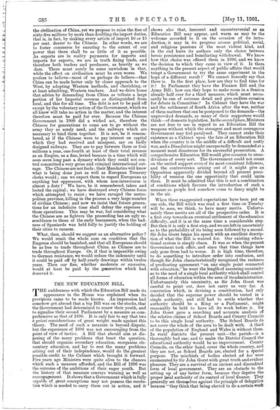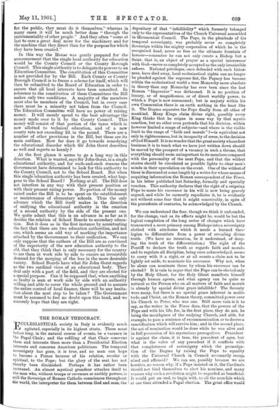THE NEW EDUCATION BILL.
IHE suddenness with which the Education Bill made its 1 appearance in the House was explained when its proviiiioris came to be made known. An impression had somehow got abroad that a big Bill was on the stocks, that the Government had determined to renew their youth, and to Aignalise their second Parliament by a measure as com- prehensive as that of 1896. It is only fair to say that two a-priori considerations of great weight made against this theory. The need of such a measure is beyond dispute, but the experience of 1896 was not encouraging from the point of view of tactics. A Bill that should aim at dis- posing of the many problems that beset the question, that should organise secondary education, reorganise ele- mentary education, and lay to rest the many problems arising out of their independence, would do the greatest possible credit to the Cabinet which brought it forward. Five years ago Ministers were quite alive to the chances which such a measure afforded, and the Bill of 1896 was the outcome of the ambitions of their eager youth. But the history of that measure conveys 'warning as well as encouragement. It shows that a Government which is fully capable of great conceptions may not possess the resolu- tion which is needed to carry them out in action, and -it shows also that, innocent and uncontroversial as an Education Bill may appear, and warm as may be the welcome accorded to it on the occasion of its intro- duction, it may in its progress arouse political, social, and religious passions of the most violent kind, and in the end leave its authors only the choice between heroic persistence and humiliating withdrawal. We know how that choice was offered them in 1896, and we know the decision to which they came in view of it. Is there anything in the present aspect of public affairs that would tempt a Government to try the same experiment in the hope of a different result ? We cannot honestly say that there is. In the first place, how are they to find time for it? In Parliament they have the Finance Bill and the Army Bill; how can they hope to make room in a SeSsion already half over for a third measure, which must neces- sarily be one of extreme detail and give endless occasion for debate in Committee ? In Cabinet they have the war and the settlement of South Africa after the war, neither of them matters that can be postponed to the demands—the unprovoked demands, as many of their supporters would think—of domestic legislation. In the second place, Ministers are not free to use in regard to an Education Bill the weapons without which the strongest and most courageous Government may feel paralysed. They cannot stake their existence as a Cabinet upon the fate of an Education Bill when the country is in the middle of a difficult and costly war, and a Dissolution might unexpectedly be demanded at a moment most disastrous for its successful prosecution. A comprehensive Education Bill would give occasion to cross- divisions of every sort. The Government could not count on the united support even of its most consistent followers, and the controversies arising out of it might give au Opposition apparently divided beyond all present possi- bility of reunion the one opportunity that could unite them. It must be admitted that this is not a combination of conditions which favours the introduction of such a measure as people had somehow come to fancy might be in the air.
When these exaggerated expectations have been put on one side, the Bill which was read a first time on Tuesday will be seen, we think, to have many merits. Unfortu- nately these merits are all of the prospective order. It is a first step towards an eventual settlement of the education difficulty, and it is at the same time a considerable step. But then it is only a first step, and. we are left in uncertainty- as to the probability of its being soon followed by a second. Sir John Gorst began his speech with an excellent descrip- tion of what the Bill is wanted for. Our existing educa- tional system is simply chaos. It was so when the present. Government took office, and since that time things have only gone from bad to worse. It is high time, therefore, to do something to introduce order into confusion, and though Sir John characteristically recognised the rashness of predicating agreement "on any single point connected with education," he went the length of assuming unanimity as to the need of a single local authority which shall control all forms of education within the area of its administration. Unfortunately. this unanimity, as Sir John Gorst was careful to point out, does not carry us very far. A convention which, in devising a constitution, had only decided that the supreme power should be vested in a single authority, and still had to settle whether that authority should be a King or a Parliament, might reasonably be held to have all its work before it. Sir John Gorst gave a searching and accurate analysis of the relative claims of School Boards and County Councils to be this single local authority. The School Boards do not cover the whole of the area to be dealt with. A third of the population of England and Wales is without them. In rural districts the present unit—the parish—is a thoroughly bad one, and to make the District Council the educational authority would be no improvement. County Councils, on the other hand, cover the whole country, and they are not, as School Boards are, elected for a special purpose. The mischiefs of bodies elected ad hoc were enumerated by Sir John Gorst with great truth and evident pleasure. They are a survival of an ancient and discredited form of local government. They are an obstacle to the setting up of any better form, because they deprive the proper local authority of its control of local finance. They generally set themselves against the principle of delegation because "they think that being elected to do-a certain work for the public, they must do it themselves," whereas in many cases it will be much better done "through the instrumentality of other people." And they often "come at last to care a great deal more for the machinery and for the machine that they direct than for the purpose for which they have been created."
In this way the House was gently prepared for the announcement that the single local authority for education would be the County Council or the County Borough Council. This single authority is to delegate its powers to an Education Committee. The constitution of this Committee is not provided for by the Bill. Each County or County Borough Council is to frame a scheme for itself, which will then be submitted to the Board of Education in order to ensure that all local interests have been consulted. In reference to the constitution of these Committees the Bill makes only two conditions. A majority of the members must also be members of the Council, but in every case there must be a minority not taken from the Council. The Education Committee will have no power of raising money. It will merely spend to the best advantage the money made over to it by the County Council. This money will consist of that portion of the taxes which is now allotted to technical education, and of a new county rate not exceeding 2d. in the pound. There are a number of other provisions in the Bill, but these are its main outlines. How far does it go towards remedying the educational disorder which Sir John Gorst describes so well and regrets so keenly?
At the first glance it seems to go a long way in this direction. What is wanted, says Sir John Gorst, is a single educational authority, and for such-and-such reasons the Government have determined to look for this authority to the County- Council, not to the School Board. But when this single 'education authority has been created, what hap- pens to the School Board ? Nothing at all. The Bill does not interfere in any way with their present position or with their present rating power. No portion of the money raised under the Bill is to be spent on the establishment or maintenance of elementary schools. Thus the only advance which the Bill itself makes in the direction of unifying the educational authority is the creation of a second authority by the side of the present one. We quite admit that this is an advance in so far as it decides the relation of School Boards to secondary educa- tion. But it does so in the first instance by accentuating the fact that there are two education authorities, and not one, which seems an odd way of marking the importance attached by the Government to their unification. We can only suppose that the authors of the Bill are so convinced of the superiority of the new education authority to the old, that they think that is only necessary for the country to see them at work side by side to ensure an irresistible demand for the merging of the less in the more desirable variety. School Boards have what Sir John Gorst regards as the two cardinal vices of an educational body. They deal only with a part of the field, and they are elected for a special purpose. Can it be supposed that, when anything so faulty is seen at work side by side with an authority willing and able to cover the whole ground and to assume the entire control of local finance, there will be any hesita- tion about the next step to be taken ? The Government must be assumed to feel no doubt upon this head, and we sincerely hope that they are right.







































 Previous page
Previous page